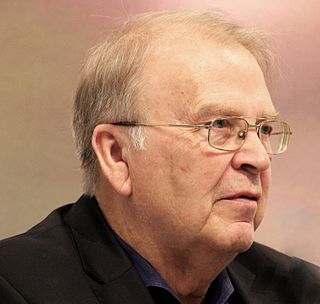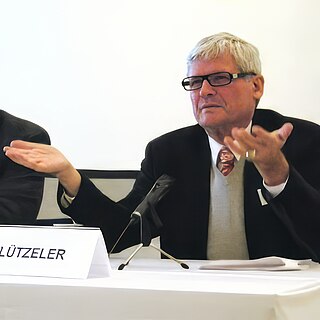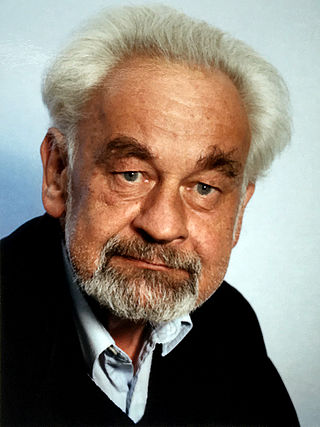Wolfgang Kuhlmann (born 19 October 1939) is a German philosopher and representative of the discourse ethics.
Wolfgang Kuhlmann (born 19 October 1939) is a German philosopher and representative of the discourse ethics.
Born in Kiel, Kuhlmann, who received his doctorate in 1974, and habilitated in 1983, is a student of Karl-Otto Apel and a colleague of Peter Rohs. He then worked as a private lecturer in philosophy at the Goethe University in Frankfurt and from 1985 to 1992 as managing director and editor of the publication series in the Forum für Philosophie in Bad Homburg. In the context of this activity there was from 1987 to 1991 a co-operation with Eberhard Schnelle . In 1989 Kuhlmann became full professor at the University of Frankfurt and in 1992 a professor at the University of Erfurt. From 1993 to 2005 Kuhlmann taught at the RWTH Aachen University.
In his philosophy, Kuhlmann affirms the possibility of ultimate justification and takes a universalist position. Especially for discourse ethics in the sense of Karl-Otto Apel, Wolfgang Kuhlmann claims a final justification.

Karl-Otto Apel was a German philosopher and Professor Emeritus at the University of Frankfurt am Main. He specialized on the philosophy of language and was thus considered a communication theorist. He developed a distinctive philosophical approach which he called "transcendental pragmatics."
Richard Hönigswald was a well-known philosopher belonging to the wider circle of neo-Kantianism.

Wilhelm Genazino was a German journalist and author. He worked first as a journalist for the satirical magazine pardon and for Lesezeichen. From the early 1970s, he was a freelance writer who became known by a trilogy of novels, Abschaffel-Trilogie, completed in 1979. It was followed by more novels and two plays. Among his many awards is the prestigious Georg Büchner Prize.
David E. Wellbery is an American professor of German Studies at the University of Chicago. As of 2022 he is the chair of the department of Germanic Studies and holds the LeRoy T. and Margaret Deffenbaugh Carlson University Professorship in the department. In 2020 he was elected to the American Philosophical Society.
Friedrich Kambartel was a German philosopher.

Ingo Zechner is a philosopher and historian. He is the Director of the Ludwig Boltzmann Institute for Digital History (LBIDH) in Vienna.
Anselm Haverkamp is a German-American professor of literature and philosophy.
Otto Friedrich Bollnow was a German philosopher and teacher.
Hans Lenk is a German rower who competed for the United Team of Germany in the 1960 Summer Olympics, and an Emeritus Professor of Philosophy. He was born in Berlin.

Paul Michael Lutzeler is a German-American scholar of German studies and comparative literature. He teaches as Rosa May Distinguished University Professor Emeritus in the Humanities at Washington University in St. Louis.

Hans Lipps was a German phenomenological and existentialist philosopher.
Ingolf Ulrich Dalferth is a philosopher of religion and theologian. His work is regarded as being on the methodological borderlines between analytic philosophy, hermeneutics and phenomenology, and he is a recognized expert in issues of contemporary philosophy, philosophy of religion, and philosophy of orientation.
Hermann Vetter is a German academic and translator who has made many works of English-language philosophy available in German. He specialized in sociology of knowledge and social psychology. His academic career was interrupted by the "student revolutions" of the 1960s.
Harald Holz is a German philosopher, logician, mathematician (autodidact), poet and novelist.

Thomas Seebohm was a phenomenological philosopher whose wide-ranging interests included, among others, Immanuel Kant, Edmund Husserl, hermeneutics, and logic. Other areas of Professor Seebohm's interests included the history of philosophy, philosophy of history, philosophy of the formal sciences, methodology and philosophy of the human sciences, the history of 19th century British Empiricism, American pragmatism, analytic philosophy, philosophy of law and practical philosophy, and the development of the history of philosophy in Eastern Europe. Despite this diverse span of interests, Seebohm was chiefly known as a phenomenologist, who "above all...considered himself a creative phenomenologist, who as a critically reflecting philosopher would look at all major issues with which he became confronted, from a transcendental phenomenological point of view."
Joachim Leilich is an emeritus professor of philosophy at the University of Antwerp, of German origin, who formerly held positions as a tutor and student-assistant at the university of Frankfurt. His main research topics are analytical philosophy, phenomenal consciousness, Ludwig Wittgenstein, and freedom of the will. He obtained his PhD under supervision of Karl-Otto Apel in Frankfurt.

Wolfgang Leidhold is a German political scientist, philosopher and artist.
Wolfgang Cramer was a German philosopher and mathematician.
Tiburtius Tibor Kneif was a German-Hungarian lawyer and musicologist.
Dimitri Ginev held the position of Professor of History of Discourses in Cultural Studies at St. Kliment Ohridski University. Ginev specialized in philosophy of science, particularly hermeneutic philosophy of science.